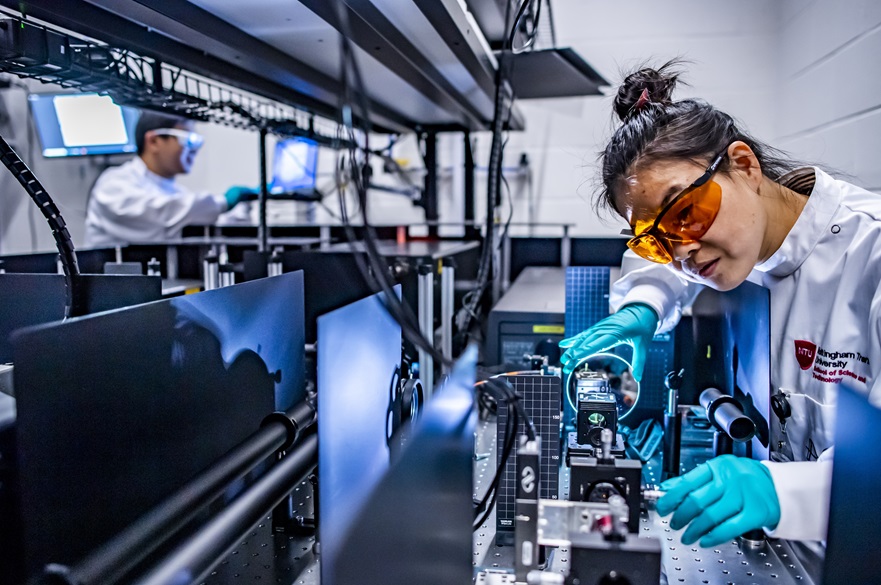Light beam will ‘grasp and hold’ single proteins linked to Alzheimer’s to reveal new insight into disease
High concentrations of light will be used to study the fast structural changes in single proteins linked to Alzheimer’s through the different disease stages in a first of its kind study.
By Dave Rogers | Published on 7 April 2025
Categories: Press office; Research; School of Science and Technology;

It is hoped the research, led by Nottingham Trent University, will provide fresh insight into the emergence and progression of neurodegenerative disease, which is known to begin up to 20 years before symptoms appear.
Understanding these processes could pave the way for early-stage diagnosis and therapies for age-associated degenerative diseases, the researchers believe.
The work is being made possible through funding from the Academy of Medical Sciences and will be led by Dr Cuifeng Ying, who is part of the Advanced Optics and Photonics (AOP) group in the university’s School of Science and Technology.
Neurodegenerative disease begins when abnormal proteins begin to form in the brain – and early-stage diagnosis and potential therapies require the detection of these single malformed proteins from a large protein population.
Current technologies, however, are unable to monitor the motions and behaviour of these proteins in solution without modifying them, which it is argued could hamper our understanding of their function.
The work will involve building on a new technique developed by Dr Ying which makes it possible to isolate and study how single proteins behave and change over time in their natural environment and while they are still functional.
The individual proteins can be studied in their natural liquid environment, as the team’s technique can mimic the body by altering factors such as salt concentration, pH, or oxygen levels.
A very high concentration of light, with a beam transmitted through a specifically engineered nanostructure, can generate the right amount of force to grasp and hold a single protein – ten thousand times thinner than a strand of hair – within a fluid, without damaging it.
The technology is able to detect how the light is scatted and the researchers can analyse this unique data to reveal how the protein is behaving in real-time.
The researchers will characterise proteins extracted from fruit flies – which share a large percentage of genes with humans – at different disease stages.
The team will also investigate the responses in the proteins when exposed to different drugs.
Dementia, one of the primary symptoms of late-stage Alzheimer’s disease affects almost 1 million people in the UK and currently costs almost £35bn a year. This cost is projected to increase due to the increasing average age of the population.
“Innovative approaches are urgently needed to understand the triggers of these diseases, enabling earlier disease detection and treatment,” said Dr Ying.
She said: “Previously we’d have had to study many proteins together to see how the group of proteins responds, but through our work we are now able to monitor the behaviour of a single living protein.
“We know that neurodegenerative diseases can start many years before any symptoms appear, as these abnormal proteins aggregate in the brain.
“We hope that knowledge gleaned from our study could drive the development of early diagnosis and therapies for several age-related degenerative diseases, potentially reducing the number of people affected as well as associated healthcare costs.”
The work is being made possible through funding from the Academy of Medical Sciences’ Springboard programme, in partnership with the Government’s Department for Science, Innovation and Technology, Wellcome and the British Heart Foundation.
Professor James Naismith FRS FRSE FMedSci, Vice-President (Non-Clinical) at the Academy of Medical Sciences, said: “Each Springboard awardee brings fresh perspectives and innovative approaches that will ultimately translate to improved health outcomes for patients and the public. The Academy is proud to provide the financial resources and career development support needed to help these outstanding scientists establish their independent research careers.”
Notes for Editors
Press enquiries please contact Dave Rogers, Public Relations Manager, on telephone +44 (0)115 848 8782, or via email.
Nottingham Trent University (NTU) has been named UK ‘University of the Year’ five times in six years, (Times Higher Education Awards 2017, The Guardian University Awards 2019, The Times and Sunday Times 2018 and 2023, Whatuni Student Choice Awards 2023) and is consistently one of the top performing modern universities in the UK.
It is the 3rd best modern university in the UK (The Times and Sunday Times Good University Guide 2023). Students have voted NTU 1st in the UK for student employability (Uni Compare 2025)
NTU is the 5th largest UK institution by student numbers, with over 40,000 students and more than 4,400 staff located across six campuses. It has an international student population of almost 7,000 and an NTU community representing over 160 countries.
NTU owns two Queen’s Anniversary Prizes for outstanding achievements in research (2015, 2021). The first recognises NTU’s research on the safety and security of global citizens. The second was awarded for research in science, engineering, arts and humanities to investigate and restore cultural objects, buildings and heritage. The Research Excellence Framework (2021) classed 83% of NTU’s research activity as either world-leading or internationally excellent.
NTU was awarded GOLD in the national 2023 Teaching Excellence Framework (TEF) assessment, as it was in 2019.
NTU is a top 10 for sport (British Universities and Colleges Sport league table 2023).
NTU is the most environmentally sustainable university in the UK and second in the world (UI Green Metric University World Rankings, 2023).